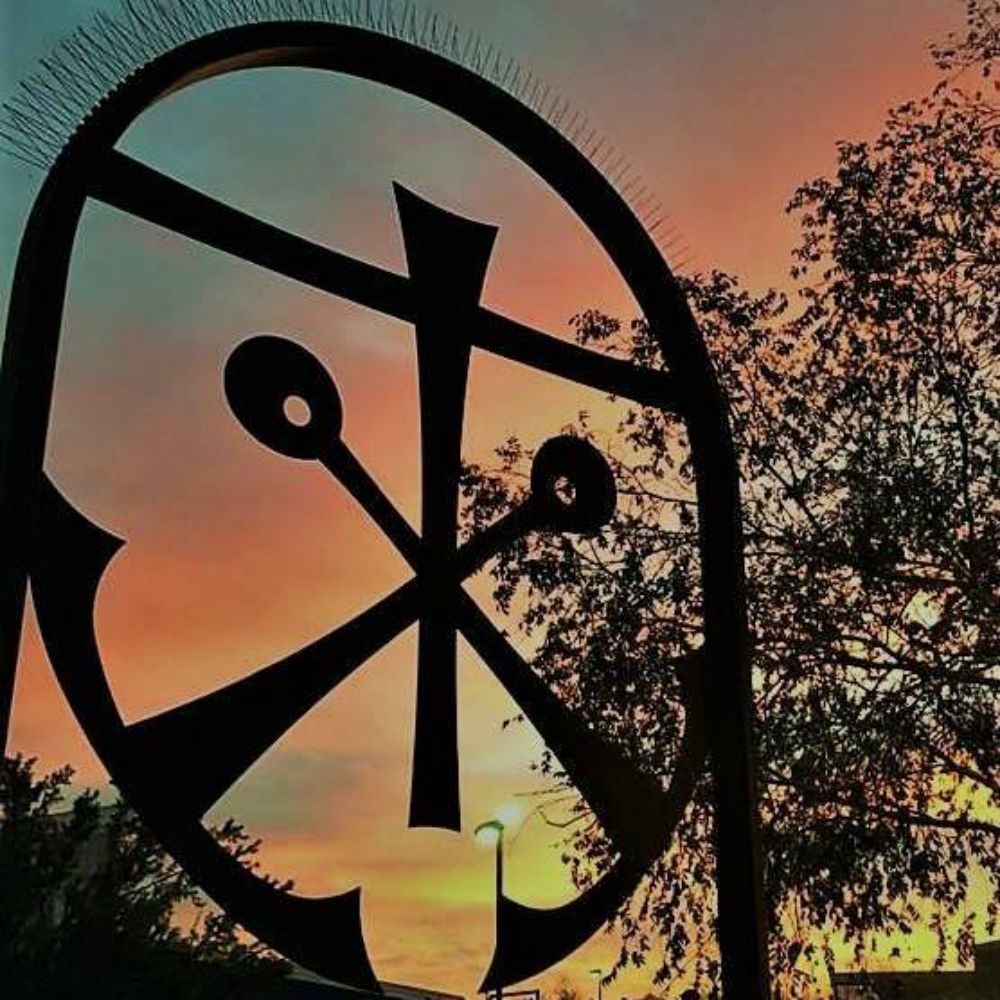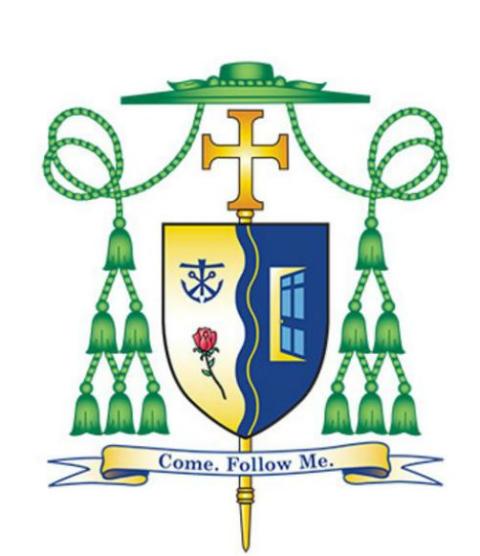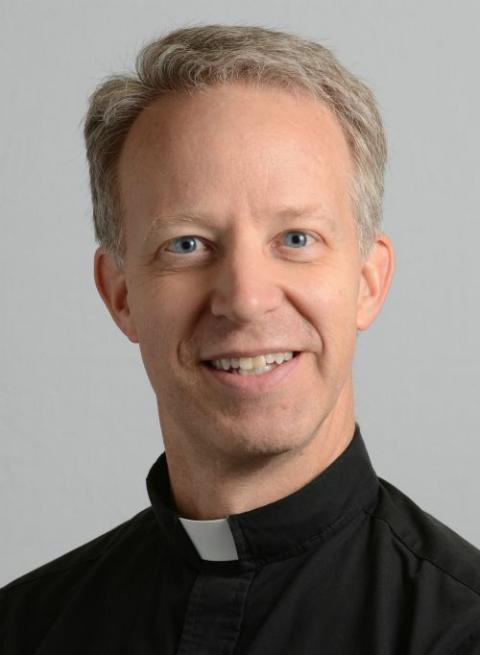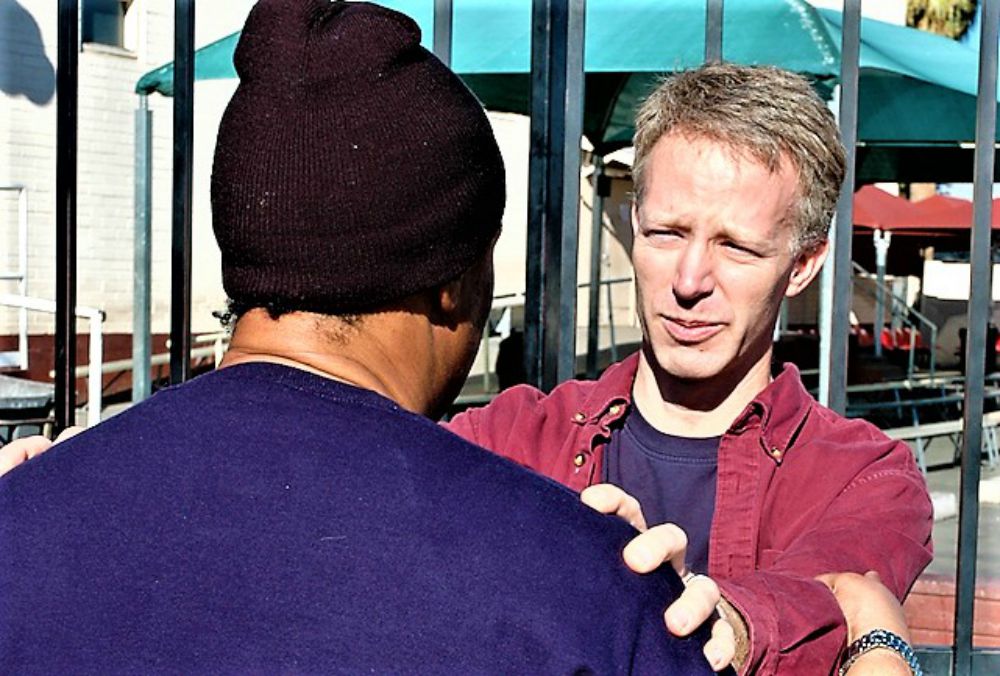
View of symbol used at André House of Phoenix (Courtesy of André House of Hospitality)
When Pope Francis exhorted priests to be "shepherds living with the smell of the sheep," he might have been thinking of a priest like Holy Cross Fr. Bill Wack, whom the pope recently chose to become the bishop of Pensacola-Tallahassee, Florida. Just take a look at Wack's coat of arms, where there is a painting of an open door.
The open door is the symbol of André House, the house of hospitality started in Phoenix by two Congregation of Holy Cross priests on Oct. 1, 1984.

Bishop William Wack's coat of arms, showing the open door symbolizing André House of Hospitality and St. André Bessette (Courtesy of Diocese of Pensacola-Tallahassee)
Wack would not be ordained a priest until nearly 10 years after the founding of André House, but in 2002 he would become its director and stay in that job for six and a half years. Director is a term that suggests power and distance, but the directors of André House live with the guests and staff of André House and work day to day with the marginalized population they have been called to serve. That means providing clean clothing for their guests, both through a clothing closet and a laundry, at which guests can drop off their dirty clothes in the morning and pick them up — clean and folded — later the same day.
It means providing a place where guests can make phone calls: local, long distance or international. It means obtaining and distributing over 5,000 blankets a year to people who live outside. It means keeping an ample supply of simple pain relievers such as ibuprofen for guests and helping those same guests get relief of another kind from lawyers who volunteer at André House. It means providing showers and toiletries and towels for their guests. It means helping guests find jobs and decent housing. It means cooking and cleaning and washing dirty sheets. It means welcoming people struggling with addiction and mental illness, people whose permanent address is "the street."
It means staying near the sheep.
While he was the director of André House, Wack wrote for its newsletter, "The Open Door." Here he is, in his own words, writing about the life and work of the community:
André House is (for us all) a classroom of learning. Here we learn how to be patient, how to share our resources, how to forgive and how to ask forgiveness, how to challenge and how to encourage, how to pray and how to put the Gospel into practice. I can think of no better setting in which to grow as a Christian and as a human being. (Fall 2006)
The season [Thanksgiving to Christmas] was not without its difficulties, however, as our building was broken into four times, we had a fire in our commercial dryer that could have gotten out of hand, and we experienced some car troubles on top of all of that. Fortunately, there were no injuries or lasting damage done. Indeed, these troubles are small compared to those that our guests endure daily. (Spring 2007)
Advertisement

Holy Cross Fr. William Wack, 2016 (CNS /courtesy Congregation of Holy Cross)
In his last entry for the newsletter, in the fall of 2008, Wack said his good-byes to the many friends and supporters of André House. He wrote:
These last six years have been among the most formative of my life. I cannot express how much I have grown as an individual and as a priest here. The Gospel has truly come alive for me nearly every day while serving our brothers and sisters in great need.
I'm struck by the honest qualifier in that last line, "nearly every day." Those are the words of a man who has actually taken care of a dryer fire and of broken down cars. Those are the words of a man who has had to struggle to learn patience and to ask forgiveness and to share resources with people who are also struggling. Those are the words of a man who, as Wack explained in his first press conference as bishop, was busy outside trying to fix the air conditioner in his Austin, Texas, parish hall when the papal nuncio called to tell him of his appointment.
They are the sorts of words I hear from servants of Christ I know: young parents of small children, middle-aged children caring for their elderly parents, and grandparents caring for their grandchildren. They are the sorts of words I hear from women and men doing the work, every day, of healing and helping and building and restoring. These people aren't deceived about the difficulty of their lives. They would never lie and say every day is one in which the Gospel comes alive. Some are days they just have to survive. But all of them know their troubles are small compared to the troubles others "endure daily." They would tell you that they have grown in and through service and that sometimes the growth has been painful. And they would tell you that when the Gospel does truly come alive for them it is in service to others, as hard as that service can be, as hard as it is.
We often speak of people ascending to high positions. It seems to me Fr. Bill Wack descended to his, by way of the soup kitchen and the clothing closet and the laundry room. He descended by way of housework, the mother's work and the father's work. He descended by way of the menial work of the doorkeeper and saint whose name André House bears, Saint, and Brother, André Bessette.
It seems a very good way for a shepherd to walk, down to the bishop's chair.

Holy Cross Fr. Bill Wack, right, talks to a guest of André House of Hospitality. (Courtesy of André House of Hospitality)





